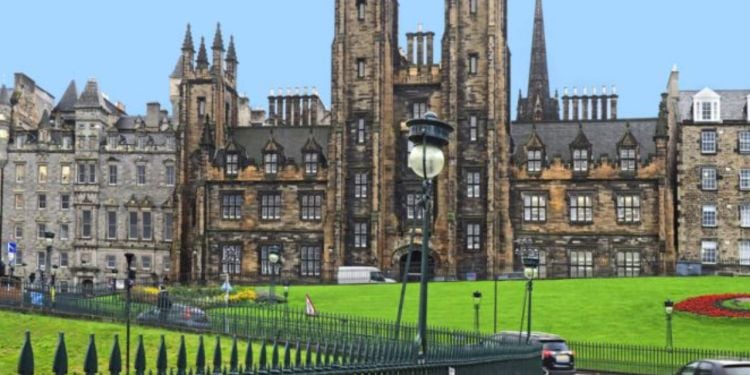Studying in Edinburgh

Edinburgh is the quirky capital city of Scotland. It is a historic city, famous for internationally renowned festivals, events, architecture, museums, and more. It is the perfect mix of thriving city life and vast, panoramic views of nature. For three years in a row, Edinburgh has been rated as the best student city in the UK, second only to London (QS World Rankings). Overall, it is ranked 18th best student city in the world (QS World Rankings). Those hoping to study in Edinburgh will not be surprised to find it is home to some of the UK's best universities.
How do Edinburgh universities work?
Universities in Edinburgh run similarly to other UK universities. In almost all cases, students apply for university having pre-decided their degree subject. Universities accept students to a specific degree program. Subsequently, UK universities focus on depth rather than breadth of subjects. While certain Edinburgh institutions will allow you to have double majors or minors, it is uncommon for students to take classes outside their degree subject.
Most undergraduate degrees in Scotland are four years long. However, each year is weighted differently, with usually only the last two counting towards the final degree's grade. This system means that many first years, or “freshers,” spend quite a bit of time enjoying Edinburgh's nightlife!
Masters programs are one year long, and PhDs are between three and four years long. The universities themselves generally fund PhDs, and Masters programs are either self-funded or funded through scholarships, which will differ between universities.
Studying and teaching culture in Edinburgh
Universities in Edinburgh, like in the rest of the UK, are assessment-based. Each module may only have one or two assessments, in the form of tests, presentations or essays. Because each assessment is worth a significant portion of the final grade, students spend a lot of time studying for each individual assessment. Students often study in either the university library or student union, and this time is known as “self-managed learning” (SML). Even though students are only in class a few hours each week, they are expected to spend many more hours engaged in SML.
Module sessions are often divided into lectures (presentations delivered to a hall of often hundreds of students) and seminars or tutorials (smaller and more interactive classes, often designed as “workshops”). Students usually enrol in three or four modules per semester, depending on their subject.
Relationships with teachers (called “lecturers”) are variable and will depend on your university, subject, and in many cases the teachers themselves. However, this usually errs on the less formal side, with it being acceptable to call lecturers by their first names.
Marking system in Edinburgh
Universities in the UK operate on a different marking (grading) system to many countries, which may shock many international students when they get their first results! Most Edinburgh universities operate on the same system, with 70% considered excellent, 60-69% considered very good, 50-59% considered good, 40-49% considered satisfactory, and below 40% fail.
The University of Edinburgh, however, differs from the usual grading system. It uses a system called the “Common Marking System” which has a 100 point marking scheme that corresponds to letters A1 through H.
International students may find that the UK culture around grades is more open, with students willingly asking for and sharing assessment or module grades with each other.
Teaching language in Edinburgh
You can expect to be taught in English in Edinburgh. International students who don't have English as a first language need to have passed a Secure English language test (SELT). Up to date English language requirements can be found on the UK Visas and Immigration website.
Edinburgh's main universities
University of Edinburgh
The University of Edinburgh is a large public university in the centre of the city, with its main buildings not far from the Old Town and Arthur's Seat. It is a top university in the UK, renowned for its research and ranked 18th in the world by QS World University Rankings. Its linguistics program is ranked 5th in the world (QS World University Rankings). Alumni include over 20 Nobel Prize winners, including recent honorary graduate Malala Yousafzai who won the Nobel Peace Prize, and many others.
The academic focus at the University of Edinburgh is more traditional than the city's other universities. General subjects such as English Literature, Law, Mathematics, and Chemistry, for example, are popular. There are also more niche - yet still very academic-focused - courses, including Astronomy, Scandanavian Studies, Scottish Ethnology, and Arabic and Persian.
With 30,000 students, the University of Edinburgh is a large university and has an international student population of nearly 30%. There are many options for international students. The Foundation Program and The Pathway Programs offer talented students, whose high school qualifications would generally not be accepted for direct entry to a degree, a route to enter the university. More information on specific programs and tuition fees is available here.
Heriot-Watt University
Heriot-Watt University is another top-ranked university in Edinburgh, with a large business and scientific focus. It is smaller than the University of Edinburgh, at around 9,000 students, with around a third being international students. Heriot-Watt University is located further out from the Edinburgh city centre than other universities. This doesn't mean that it is isolated though, as the campus is thriving in its own culture, with 380 acres of land and purpose-built facilities and accommodation.
The university itself was originally built as a technical school, and this profession-focus has been retained as it is now most well-known for its high-quality research. Its highest-ranked subject is engineering at 101st (QS World University Rankings).
Heriot-Watt also prides itself on its international outlook and has campuses worldwide including Dubai and Malaysia, and campuses in Edinburgh, Scottish Borders and Orkney within Scotland. Students can take advantage of the university's internationalisation by doing inter-campus transfers as part of the Go Global scheme, meaning students can spend a semester, year or longer at different campuses. More information on applying to Heriot-Watt can be found here.
Edinburgh Napier University
Edinburgh Napier University has an industry focus, and over 95% of students are in further work or study within six months of graduation. Here you will find more practical courses, including Journalism, Cybersecurity and Computer Forensics, International Tourism Management, and Film and TV Production. Napier University hosts over 4,000 international students.
Napier has three campuses across the city: the business school overlooks the city at Craiglockhart campus; engineering, computing and creative subjects are based at Merchiston campus which is situated in Morningside; and the applied sciences, health and social care subjects are housed at Sighthill campus, which is towards the airport and home to the sports facility. More information on applying is available here.
Queen Margaret University
Although the university has existed since 1875, it was only granted a university title in 2007. Since this time, a purpose-built campus was set up in 2007, located in the East of Edinburgh. Queen Margaret is best known for its nursing school, and the university offers the broadest range of health professional degrees in Scotland, including dietetics, occupational therapy, physiotherapy, podiatry, radiography, audiology, art psychotherapy, music therapy, and speech and language therapy.
The Queen Margaret University student population has around 25% of international students who originate from over 70 countries. Currently, 77% of the student body is female. More information on international study at Queen Margaret University is available here.
Entry conditions in Edinburgh universities
If you are from an EEA country or Switzerland, you currently do not need a visa to study in Scotland. If you meet the university's basic requirements, such as A-level equivalents and a satisfactory English language level, then you will be permitted to study in the UK.
If you are from outside Switzerland or EEA, you will need a visa to study in the UK. Getting a visa can be an expensive and lengthy process. You can apply for the visa starting three months before your course's start date. However, you should plan to begin collecting paperwork as soon as possible.
The most common student visa is Tier 4. This visa application requires an unconditional offer from your university, a confirmation of acceptance of studies (CAS) letter, a criminal background check from your home country and any country you have been a resident in, biometric information including photographs and fingerprints, and proof of existing savings, the amount of which is dependent on the length of study. If the course is classified as a “short course” ie. a language course or short period of research, then you may be eligible for the Short Course Visa, which is less expensive.
The cost of a visa will depend on the length of your course and other factors but can range from £93 to £335. Since 2015 the UK has instituted an added healthcare surcharge which includes access to the UK's National Healthcare System. This price will also depend on the length of your study. Student visas often allow students to work for up to 20 hours a week during term time with certain other working restrictions.
Before applying, you should confirm all legal specifics on the UK visa and immigration (UKVI) website. UK immigration processes are subject to short-notice change, especially with the recent referendum to exit the EU. It is important to check current requirements on the UKVI Compliance website. You can also check updated visa processing times.









